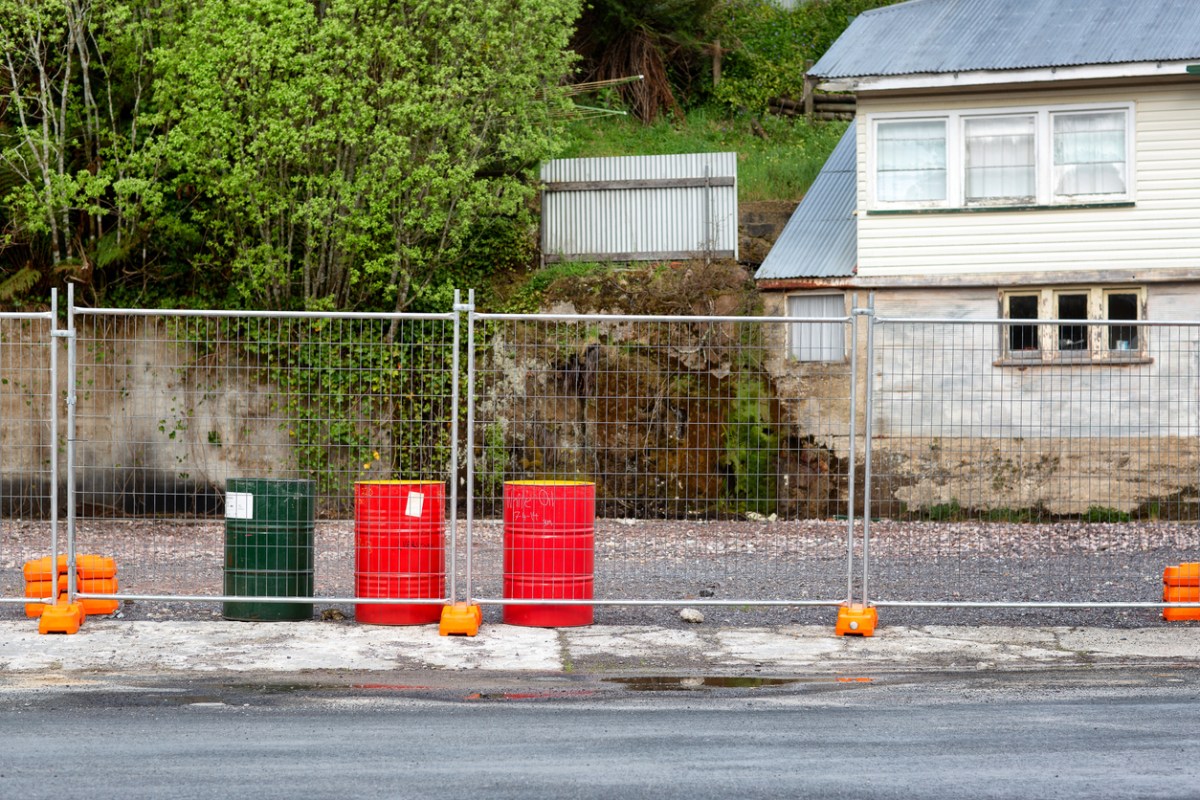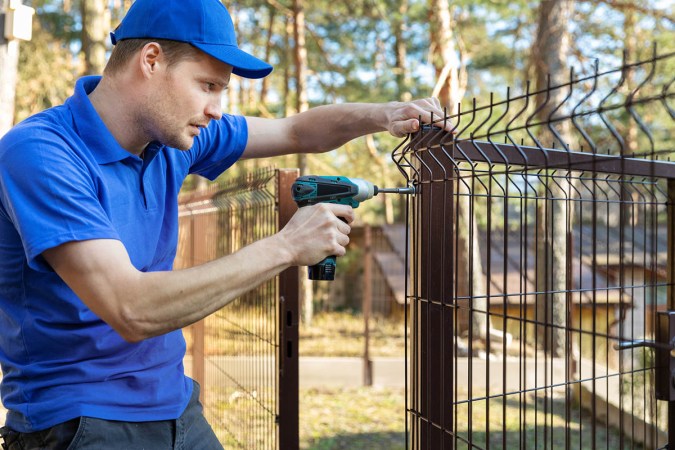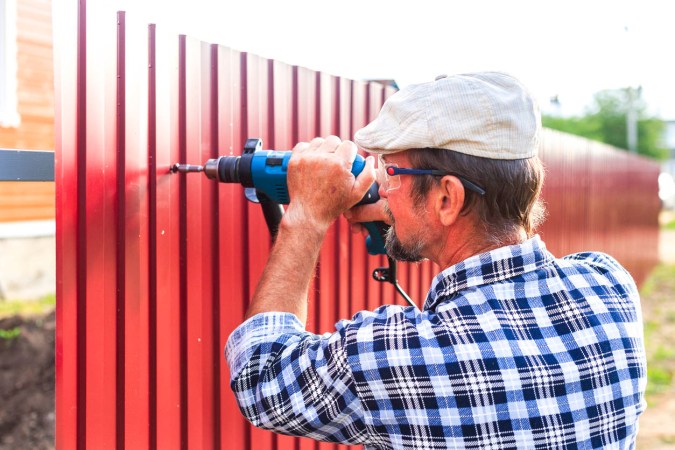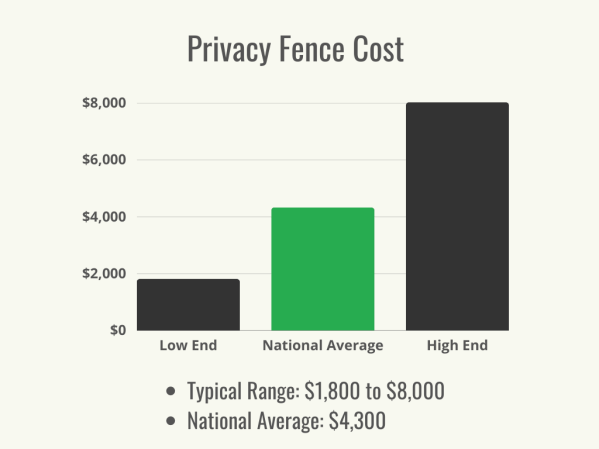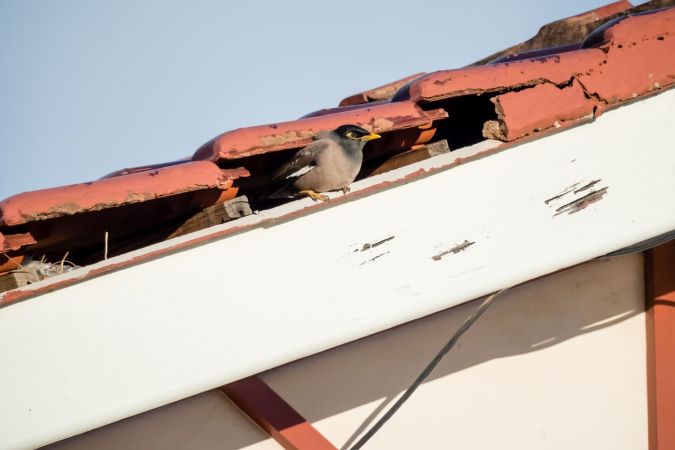We may earn revenue from the products available on this page and participate in affiliate programs. Learn More ›
Highlights
- The typical cost to rent a temporary fence ranges between $150 and $500, with a national average cost of $350.
- The exact cost of temporary fence rental depends on the rental duration, the fence size, delivery and installation costs, and any add-ons selected.
- There are three types of temporary fences: barricade fencing, orange plastic fencing, and security fencing. Orange plastic has the lowest rental cost, while security temporary fencing has the highest cost.
- Temporary fence rental is ideal for private events, home improvement projects, and tree and garden protection.
People opt for temporary fence rental for many different reasons, ranging from practical to logistical. If someone is tackling a renovation or construction project, a temporary fence can secure the work area and keep unauthorized people out of the space. It can also prevent accidents by creating a barrier between the construction zone and the rest of the property, reducing injury to children, pets, or visitors. Temporary fencing can also be used as a temporary privacy fence during outdoor events or parties, and it can also be useful for containing pets or creating designated play areas for children. Another use would be to secure the property temporarily during landscaping projects or while waiting for a permanent fence installation.
Temporary fence rental cost can vary depending on the length of the rental, the type of fencing needed, and the location of the temporary installation. According to Angi, temporary fencing rental costs can range from $150 to $500, with many people spending an average of $350 to rent a 60-foot fence for 1 month. Additional expenses can include delivery, setup, and removal fees. Compared with permanent fence installation cost, a temporary fence is more budget-friendly for short-term needs. If a permanent fence is damaged, it’s usually cheaper to pay for the cost of fence repair rather than install a brand-new fence.

Factors in Calculating Temporary Fence Rental Cost
Determining the cost of a fence rental involves the rental duration, fence size, and additional fees for delivery and installation. Rental duration can significantly affect the overall cost, with longer rental periods generally leading to lower monthly rates. Fence size and type also play a role, with larger or more specialized fencing options typically costing more. Delivery and installation fees vary depending on the distance to the site and any specific requirements.
Rental Duration
Typically, longer rental periods result in lower monthly rates. Renting a temporary fence for a single day or weekend event may have a higher price per day compared to renting the same fence for a month or longer. This is because suppliers often offer discounted rates for extended rental periods.
| Rental Duration | Cost to Rent per 6-Foot by 12-Foot Panel (Installed) |
| A few hours | $50 to $87 |
| One day | $35 to $85 |
| One weekend | $30 to $75 |
| One week | $25 to $50 |
| One month | $20 to $50 |
Fence Size
The size of the temporary fence refers to both its length and height. Temporary fences come in various lengths, ranging from 6 to 12 feet, and heights ranging from 4 to 8 feet. The size of the fence affects the overall cost because it determines the number of panels that are needed to span a specific distance. When renting a temporary backyard fence, the price is calculated per panel, which is the standard way of measuring a fence. The longer the fence, the more panels are needed, which increases the rental cost. Similarly, the taller the fence, the more materials are needed, which also leads to an increased rental price.
Delivery and Installation
Delivery and installation fees can vary depending on the distance to the rental site, the quantity of fencing needed, and any special requirements for the installation. Delivery fees hinge on the transportation logistics involved in getting the fencing materials to the installation site. Traveling longer distances or to remote locations can be more expensive since the moving truck will use more gas and it will take more time to get there.
Installation fees cover the labor and equipment that’s necessary to set up the temporary fencing. This can include digging holes, erecting panels, and securing them in place. Difficult installations or installations that require specialized equipment can be more expensive. Many of the best fence companies will include the delivery and installation fees with the overall rental quote, but it’s always recommended to check their policies about these charges.
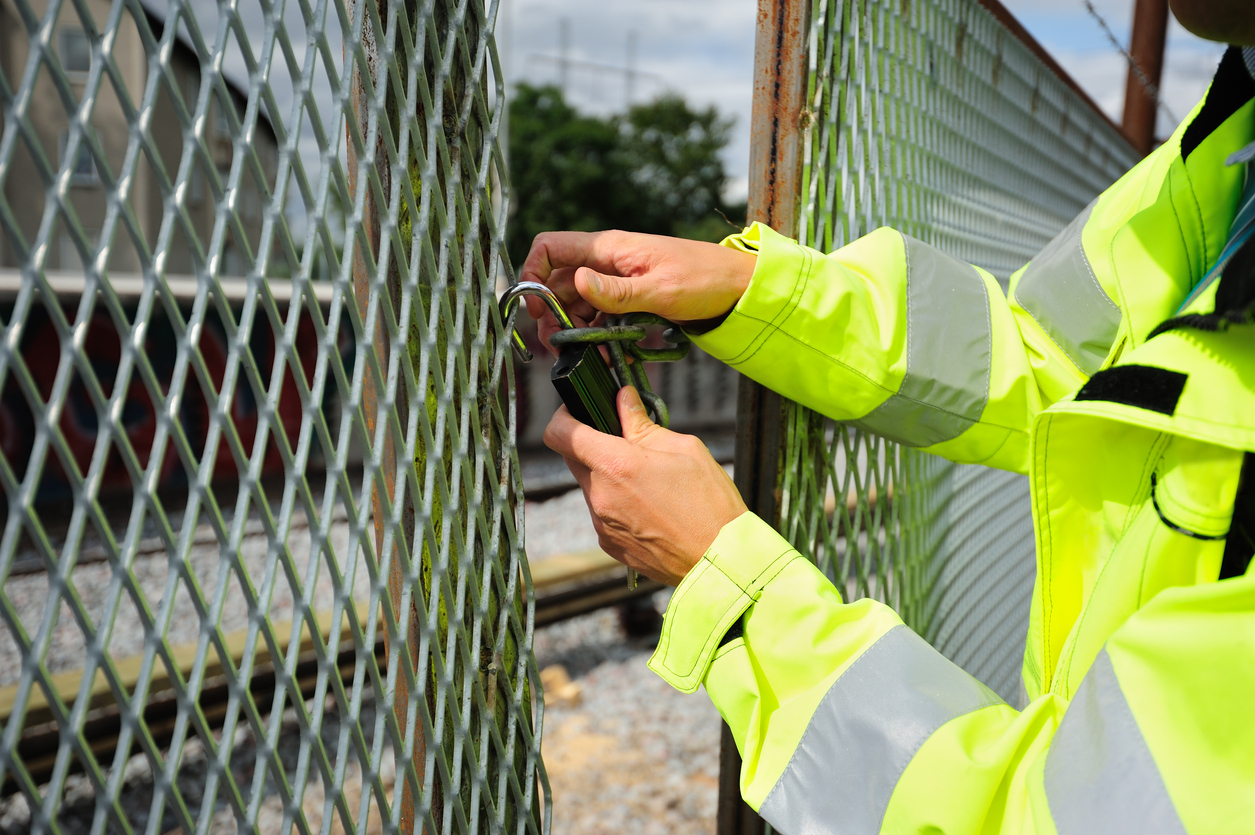
Additional Costs and Considerations
In addition to the base rental cost for a temporary fence, there are several additional factors to consider when calculating the total expense. These can include optional add-ons and supplementary rentals that enhance security, privacy, or functionality.
Fence Padlock
A fence padlock is an optional add-on for temporary fence rentals that provides extra security. The cost of a fence padlock ranges from $20 to $40 per lock. While it’s not a significant expense compared with the base rental cost, adding padlocks to the fence can increase the overall rental cost depending on the number of locks that are needed. On occasion, the price of a padlock is included in the rental price since it’s needed to secure the fence.
Fence Shade Cloth
A shade cloth is a mesh-like material that is used to reduce heat and block harmful UV rays while still allowing air circulation. It can also enhance privacy by partially obscuring the view through the fence. For 60 feet of coverage, the average price is approximately $200.
Fence Gate
The cost of a fence gate rental can vary depending on the size, material, and complexity of the gate. Fence gates can be rolling gates, swinging gates, or double swinging gates. Larger gates that are used for vehicle access will be more expensive compared with smaller pedestrian gates. The average range for a fence gate is from $100 to $400 for a 3-foot by 6-foot gate.
Sandbag Weights
Sandbag weights are used to secure the base of the fence panels and prevent them from moving, especially in windy conditions. The cost of sandbag weights run from $3 to $8 per bag for a 1-month rental.
Fence Screen
A fence screen, also known as a privacy screen or windscreen, is a mesh material that attaches to temporary fencing panels to provide additional privacy, wind protection, and dust control. Adding a screen to the fence rental ranges from $40 to $70 for each 6-foot by 12-foot panel.
Additional Rentals
Additional rentals such as portable toilets, temporary power, barbed wire, and portable storage can also influence the overall cost to rent temporary privacy fencing, not to mention the cost of insurance.
- Portable toilets. Also called port-a-johns or porta-potties, portable toilets are commonly used at construction sites or at large outdoor gatherings. The cost of portable toilets varies depending on the duration of the rental, the number of portable toilets, and whether cleaning and maintenance is required. On average, portable toilet rental is $125 to $300 per month.
- Temporary power. Outdoor events often require power sources for lighting, audio systems, and other equipment.Construction sites also need temporary power to run tools and operate machinery. The cost of renting generators and other sources of temporary power ranges from $1,000 to $4,000, and professional installation of a temporary power pole can cost from $1,700 to $4,500.
- Barbed wire. Barbed wire is used for projects or events that require a higher level of security. Barbed wire acts as a deterrent, minimizing the risk of vandalism or trespassing. The rental cost runs from $1.50 to $3.50 per linear foot, including installation.
- Portable storage. Portable storage is often needed for events or construction projects to store equipment, supplies, or personal belongings. The cost of portable storage rentals varies depending on the size and type of the storage unit, the duration of the rental, and delivery and setup fees. They typically range in price from $190 to $230 per month in addition to the $100 to $200 fee for delivery and pickup.
- Insurance. Fence rental companies may include insurance coverage as part of their service, which can increase the rental fees. If insurance coverage is not included, customers may need to get their own insurance to protect against potential liability or damages to the temporary fencing. This additional insurance expense can increase the overall cost of temporary fence rental. The level of insurance coverage required by the rental company can vary depending on the duration of the rental, the size of the project, and the specific terms and conditions of the rental agreement.
Temporary Fence Rental Cost by Type of Fence
Different types of temporary fencing offer varying levels of durability and security. The most common types of temporary fencing include barricade, orange plastic, and security temporary fencing.
| Type of Fence | Average Rental Cost per 60 Linear Feet |
| Barricade | $150 to $300 |
| Orange plastic | $60 |
| Security | $135 to $500 |
Barricade Temporary Fencing
Barricade temporary fencing is designed to provide a temporary barrier for crowd control and event management. It’s typically constructed of interlocking panels made of plastic or metal, which are easy to assemble and disassemble as needed. It’s commonly used at construction sites, concerts, festivals, and sporting events. Barricade fences range in price from $150 to $300 for 60 linear feet per month.
Orange Plastic Temporary Fencing
Orange plastic temporary fencing is a type of fencing made from durable plastic materials and is typically used as a construction fence. It’s highly visible due to its bright orange color that’s intended to alert people to potential hazards or restricted areas. While this type of orange plastic fencing isn’t the most secure or durable, it’s an affordable solution when fencing is needed but a temporary chain-link fence isn’t in the budget. Orange plastic temporary fencing costs about $60 for 60 linear feet.
Security Temporary Fencing
Designed to provide increased safety, security temporary fences are sturdier than temporary privacy fencing. This fencing is typically made from chain link, wire mesh, or metal with reinforced panels, and some even have anti-climb features. The advanced security features of this type of temporary fencing often results in higher rental costs compared with those of a standard temporary metal fence or a portable chain-link fence. The increased durability and strength add to the overall cost. On average, a security fence rental ranges from $135 to $500 for 60 linear feet.
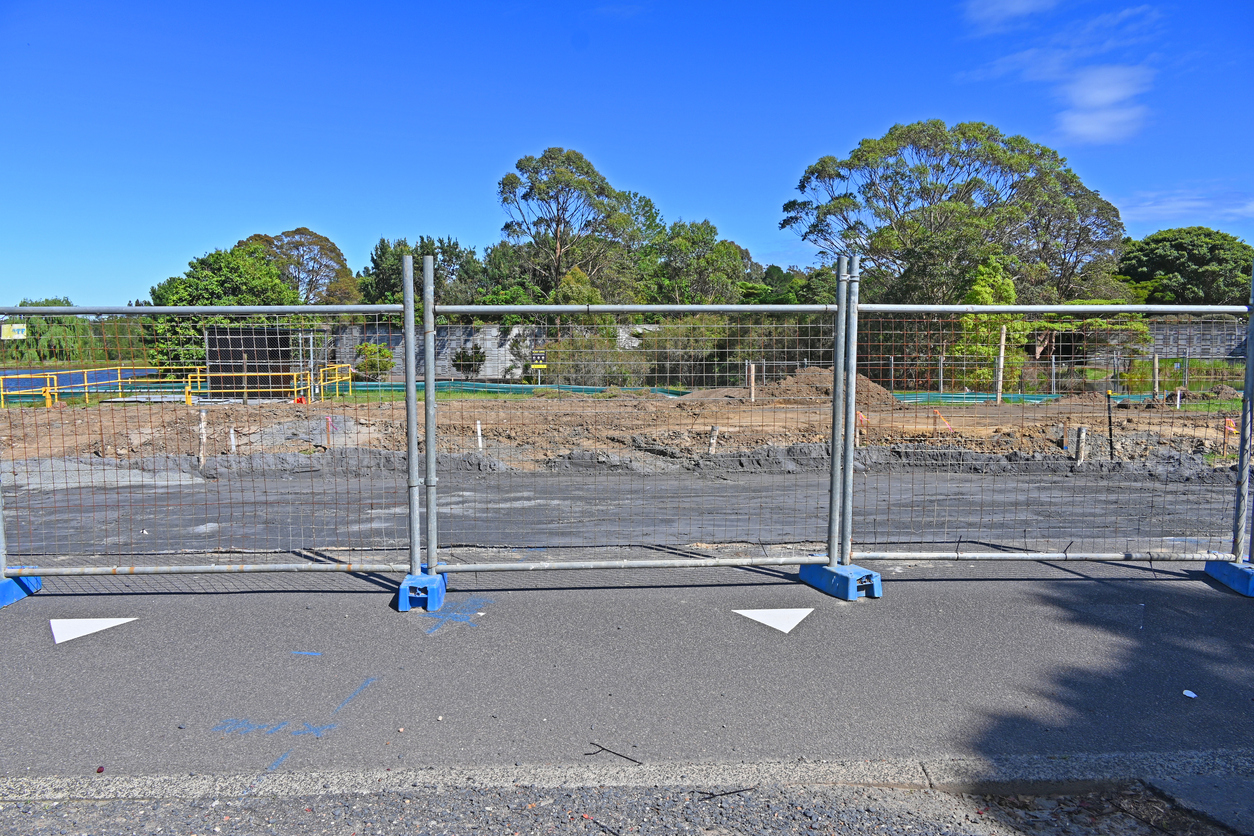
Do I need to rent a temporary fence?
There are many situations where temporary fence rental can be beneficial. Whether someone is hosting a private event, undertaking a home improvement project, protecting trees or a garden, or even ensuring safety at a construction site, temporary fence rental can provide security, privacy, and peace of mind.
Private Event
If someone is hosting a private event such as a wedding, party, or concert, temporary fencing can provide security, crowd control, and set boundaries to ensure the safety and privacy of guests. Since the cost of a privacy fence is a significant investment, many people opt for a temporary fence for their short-term needs.
Home Improvement Project
During home renovation or construction projects, temporary fencing can help protect the work area to prevent accidents and keep unauthorized people out.
Tree Protection
When landscaping or construction work is done near trees, temporary fencing can protect tree roots, trunks, and branches from damage caused by heavy machinery or foot traffic.
Garden Protection
Temporary fencing can safeguard gardens from pests, animals, and foot traffic, protecting plants, flowers, and vegetables while maintaining the beauty of the garden space.
DIY vs. Hiring a Pro
Those needing a temporary fence installed have the choice of renting and installing a temporary fence themselves, but these types of fences can also be installed by a fencing contractor. There are obvious benefits to hiring for this project: professionals can tackle this job quickly and efficiently. Those choosing to hire will not need to devote time and energy to the labor of installation.
However, installing a rented temporary fence oneself can help save on the total of the project, since labor wouldn’t be outsourced. Some companies offer temporary fences for rent. These include Sunbelt Rentals, National Construction Rentals, and United Rentals, just to name a few.
How to Save Money on Temporary Fence Rental Cost
If a customer needs temporary fencing for a private event, construction site, or other projects, the cost of the rental is likely a concern. Shoppers can follow these tips to save money on temporary fence rental costs.
- Plan ahead. Booking temporary fencing well in advance allows customers to take advantage of early booking discounts and makes sure the fencing is available when they need it. This can also help avoid rush fees or last-minute price hikes.
- Get multiple estimates. Getting at least three quotes from reputable temporary fence rental companies can allow customers to compare prices, services, and terms. Customers will want to look for providers offering competitive rates and discounts for bulk orders or extended rental periods.
- Choose the standard options. Choosing standard temporary fencing options without unnecessary add-ons or customizations can keep costs down. Basic fencing options often offer the best value for short-term projects or temporary needs.
- Calculate the rental duration. Renting temporary fencing for the exact duration needed will help avoid unnecessary rental fees. By efficiently planning the project timeline, customers can minimize the rental period and return the fencing promptly once it’s no longer needed.
- Bundle as needed. Some temporary fence rental companies offer bundled services such as delivery, setup, and removal at a discounted rate. Customers can take advantage of these packages to save on the overall costs.
- Negotiate terms. Customers may want to negotiate with rental companies for better pricing or flexible terms, especially for large or long-term projects. Building a good rapport and discussing the specific needs of the project can be helpful.
Questions to Ask About Temporary Fence Rental
Asking the right questions when considering temporary fence rental is important to make sure a customer gets the best service and value for their needs.
- Is your company licensed and insured?
- Will you provide references?
- What is included in the rental price?
- What types of temporary fencing do you offer, and which would best suit my needs?
- Can you provide a detailed quote including all costs and any additional fees?
- How far in advance should I book the fencing?
- What is your availability?
- Will you handle delivery, setup, and removal of the fencing?
- What safety features or additional accessories are available for the fencing?
- Are there any installation restrictions?
- Is there a point of contact for questions or if any issues arise during the rental period?
- Are there any penalties or additional charges for damage to the fence?
- Can I extend the rental period if needed, and what are the additional costs?
- How do I return the fencing once the rental period is over?
- What is your payment plan?
- How can I leave a review of your services?
FAQs
Temporary fencing is a popular choice for a variety of events and construction areas. If someone is considering renting a temporary fence, they may have a few questions about the best type of fencing and how it’s installed.
Q. What’s the best type of temporary fencing?
The best type of temporary fencing depends on the specific needs and requirements of the project or event. Barricade fencing is an excellent choice for crowd control and barriers at events, while orange plastic temporary fencing is highly visible and works well for construction sites. Security temporary fencing provides protection and will deter people from entering a specific area.
Q. How do you install a temporary fence?
The area where the fence will be installed is cleared of debris and any other obstacles. The fence panels are positioned and connected using braces or clamps to create a continuous fence. After the entire fence is constructed, additional accessories, like gates, shade cloth, or security features, can be installed as needed. The fence is secured in place using stakes, sandbags, or bolts to make sure the fence is stable.
Sources: Angi, Fixr

